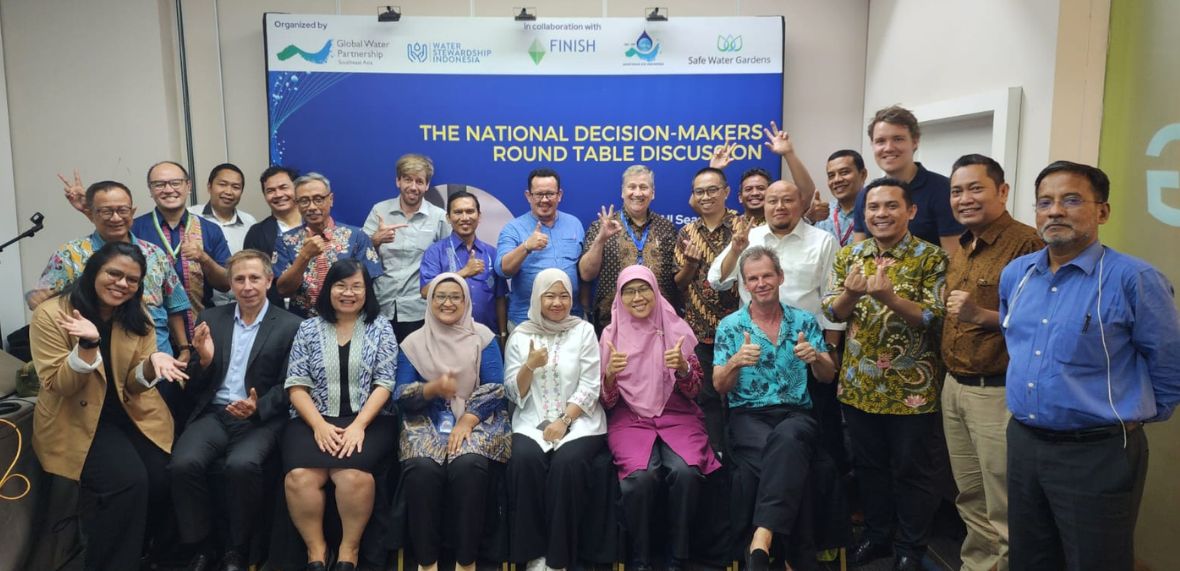The round table discussion in a hybrid format opened with a speech by representatives from the Directorate for Housing and Settlement (Ministry of National Development Planning/BAPPENAS), Ms Aisyah Nasution. In her opening remarks, she emphasized the need for micro-finance to accelerate WASH access as the government has limited funds to meet the 2030 agenda of 100 per cent universal access. The BAPPENAS is welcoming FINISH MONDIAL who plan to expand their business in Indonesia.
FINISH MONDIAL representative Mr Valentin Post shared how the organization started their business as a Public Private Partnership in 2008. Between 2012 and 2018, the company successfully developed a proven model for sanitation market development through health awareness creation, demand creation, sanitation marketing, mason training (trigger the community to build toilets), and people able to afford toilets (through micro-credit). Micro-finance for sanitation is a business proposition. It creates jobs, create market share, value chain ecosystem, good repayment rate (> 98%), and access to social investors. Their business in Asia (India, Bangladesh) and Africa (Kenya, Ethiopia, Uganda) has proven to increase the number of safely managed sanitation significantly. Sanitation and water impact funds started with an institutional investor who invested their money through a fund manager (i.e. Cardano), then they provided a loan in local currency through a microfinance institution. This microfinance institution then gives the loan to the needed households.
The discussion continued with a brief presentation from the Safe Water Gardens (SWG). Mr Marc van Loo share the SWG concept of safe sanitation access and his ambition on how the Model Village Program (MVP) can reach a Global Scale Up. With the help of GWP-SEA’s e-survey platform, the project in Bintan was successful and received recognition from the Governor of Bintan. SWG was featured in GWP-SEA’s Innovative Solution for Sustainable Development on 4 August 2023.
Mr. M. Alfi Syahrin, Executive Director of the Microfinance Innovation Center for Resources and Alternatives (MICRA), spoke after the SWG's presentation. With assistance from GIZ, Mercy Corps, and the World Bank, MICRA was founded in 2006 to promote the growth of microfinance services in Indonesia. Mr Ali discovered that the traditional microfinance providers needed to alter their business practices and way of thinking. The loaners are usually an entrepreneur who create jobs, not for personal consumption such as constructing a toilet or water access. Thus, they often concentrate on financial products that offer quick profits first. This means that a list of products derived from market research and help from the regulator in the form of significant regulation is required to finance WASH access through micro-credit. Only 51 of the 127.124 cooperatives that are now in existence offer microfinance for WASH access, according to data from the Ministry of Cooperatives and SMEs. Second, no traditional insurance provider has participated in assuming default risks thus far. With the goal of promoting SDG 10, reduced inequality, MICRA has helped remote areas with access to microfinance and concurred with the publication of the country's financial inclusion policy.
The conversation moved on to include Mr. Don Johnston, a representative from WATER.ORG Indonesia, who explained that in order to get the best results, it's critical to form partnerships with like-minded organizations. "Identifying a market-friendly solution is important," he continued. Microfinance is a solution that can help low-income communities improve their lives (by solving problems). Mr. Don said that WATER.ORG began operations in Indonesia in 2015 and has since established a collaboration with micro-credit providers like Koperasi Baik. Of these, approximately 844,512 loans have been established, which have reached 4,364,508 individuals, with 91% of borrowers being female and the average loan amount being 189 US dollars / IDR 2,835,000. The organization collaborates with community-led organizations like KPSPAMS (under the PAMSIMAS program) in addition to working directly with households. Gaining knowledge of how to obtain non-revenue reductions of up to 35% was part of the facilitation and strengthening. Additionally, WATER.ORG collaborates with water service companies (PDAM) to enhance their marketing efforts and introduce installment payments to lower-income homes.
Other notable information gained from the discussion was from Koperasi Baik Ms. Titin and Mr Joko from the Ministry of Public Works and Housing. Ms. Titin explained the challenges that they were facing as the micro-credit provider. She argued that the cooperation sometimes does not have sufficient funds to support the WASH access and difficult to give a credit that would not be used for capital gained or for some households outside of the operational area. Mr Joko argued the government can only fund one-third of the WASH access, thus the presence of micro-finance is very much appreciated. The funding scheme from Corporate Social Responsibility should also be
In an open discussion session, several issues were raised. Koperasi Baik raised their concern regarding their capacity of not being capable of educating the villagers on sanitation matters and having limited capital. MICRA representative underlined the need to change the mindset of the micro-finance providers of easy gained. “Private sectors can assist in paying the interest or provide subsidies”, added Mr Fany of GWP-SEA. PAMSIMAS shared several information such as their cooperation with WATER.ORG to increase the access and with JAMKRIDA as the guarantor, also their worked on integrating the micro-credit and CSR. PAMSIMAS added the high potential of micro-credit for WASH access as they can only provide 1 service out of 8 Neighbourhoods (RW). Represented the private sector was SINARMAS who has implemented Safe Water Gardens’s WASH access at to locations, though the concept was more a charity (CSR) than micro-finance. They also tried to connecting sanitation program with Village Development Index as water and sanitation are part of it.
Koperasi Baik answered the question from FINNISH MONDIAL regarding the human resources and capital issues. Ms Titin answered that Koperasi Baik adopted syariah business whilst the issue of personnel more to their difficulty to understand the WASH business (the community’s needs, quality control, pipe issue, including marketing which tend to sell an easy product).
